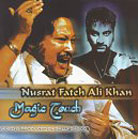August 2000
The album Magic Touch is one of the finest examples of appropriation that has occurred since the great vocalist’s demise. His passing has seen countless DJs and mixers harvest his musical legacy, extracting his famous vocal exploits from the surrounding contexts of the large body of surviving recordings and placing it within the altered context of hip-hop, techno and house-music styles. While those who know Quawwali to be religiosity incarnate might find this disingenuous and disturbing, the departed master fluidly versed in the various idioms of classical Hindustani vocal styles was at heart a consummate modernist. He constantly absorbed new influences and actively experimented to expand the appeal and push the envelope of Quawwali. In turn, he amassed a truly monstrous musical vocabulary from which he freely culled during his marathon improvising sessions, responding intuitively to the mood, make-up and reception of his audience. In Magic Touch, newcomers to Nusrat Fateh Ali Khan will plunge headlong into a truly riveting, deconstructionist mix of expertly applied technobeats, voice coder shrapnels, echo loops, subterranean bass attacks and instrumental fragments over which the totally unglued messianic scatting of the singer bursts forth like an unrestrained force of nature. When Nusrat hits certain high notes and energizes them with his vibrato, it’s as though whatever obstructions occur naturally in the throats of lesser mortals have been removed, tonsils and all, and what emerges is pure drive and emotion, light years beyond any concerns for the occasional hoarseness that is the physical recoil from such intensity. Forget about your high-falutin', transparent-til-eternity audiophile systems. This is stuff for 18" subwoofers and horn-loaded, high-sensitivity missiles. Unlike those CDs that sport jacketed warnings about backwards-recorded satanic influences, the lyrics of Nusrat revolve exclusively around esoteric Muslim poetry extolling human immersion into the Divine via ecstasy, love and active surrender. What Magic Touch accomplishes is a mind-bending meeting of an underground scene of low-rider jeans, daring body piercing, jagged break dance moves, strobe lights and ecstasy-enhanced adrenals with the world-weary sannyasins on the secret Himalayan trail to the forbidden Drilung gompa in Eastern Tibet. While truly off the charts, this unlikely apotheosis nevertheless carries the full blessing power of the departed master, who has engaged in similar experiments with Michael Brook that now constitute an unforgettable legacy at Peter Gabriel’s Real World label. Apparently a reissue, Magic Touch hit US retail stores this April. It is a superior, while farfetched, example of East-West fusion and, in hindsight and because it works so bizarrely well, testament to the late singer’s cutting-edge inventiveness. While a proposed sampling of Pavarotti over drum machines sounds suspiciously lame, Nusrat Fateh Ali Khan and techno as pulled off here can only be called phat-n-astic. Pump up the volume and go! GO BACK TO: |
 Nusrat Fateh Ali Khan - Magic Touch
Nusrat Fateh Ali Khan - Magic Touch![[Reviewed on CD]](../format/regcd.gif) Nusrat Fateh Ali Khan is remembered by many as one of the most fascinating
voices of the 20th century. He was celebrated as a living icon who single-handedly revived
the ancient Sufi style of Pakistani Quawwali. He adapted it to modern sensibilities by
introducing accelerated tempi, jackhammer-style syncopated scatting and a truly unhinged
quality of emotional abandonment, such as the Western world had not heard before. He was
just about to reach truly international mega-stardom, with concert appearances with the
likes of Madonna and Luciano Pavarotti already booked, when a heart attack catapulted the
physically massive singer into the arms of the Divine Beloved, whom he had praised
constantly throughout his life with his devotional art.
Nusrat Fateh Ali Khan is remembered by many as one of the most fascinating
voices of the 20th century. He was celebrated as a living icon who single-handedly revived
the ancient Sufi style of Pakistani Quawwali. He adapted it to modern sensibilities by
introducing accelerated tempi, jackhammer-style syncopated scatting and a truly unhinged
quality of emotional abandonment, such as the Western world had not heard before. He was
just about to reach truly international mega-stardom, with concert appearances with the
likes of Madonna and Luciano Pavarotti already booked, when a heart attack catapulted the
physically massive singer into the arms of the Divine Beloved, whom he had praised
constantly throughout his life with his devotional art.